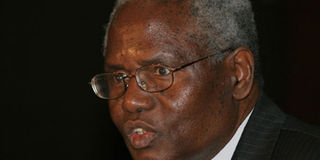State faces pension crisis as more workers turn 60

Former Public Service Head Francis Muthaura in March 2009 introduced a new policy that raised the retirement age from 55 to 60. Photo/FILE
What you need to know:
- More than 10,000 Civil Servants who were given a five-year lifeline in 2009 set to retire
More than 10,000 civil servants and teachers are set to retire next year, heralding the beginning of a pension crisis for the government.
Just a day after the General Election on March 4, the senior workers will head for the exit door following the expiry of a five-year extension for the civil servants and teachers who were expected to retire in 2009.
Despite robbing the government of experienced but ageing civil servants and teachers, the mass retirement will plunge the country into an expenditure crisis in the form of massive pension payouts.
Former Public Service Head Francis Muthaura in March 2009 introduced a new policy that raised the retirement age from 55 to 60.
Mr Muthaura’s decision was welcomed by employees who had not received retirement notices and those whose pensions had already been processed but had not attained the retirement age of 55 by March 5, 2009.
According to Public Service Permanent Secretary Titus Ndambuki, the new scheme would save the government Sh15 billion over the five years.
At least 15,000 teachers and civil servants are expected to retire beginning in December in what could plunge the country into a serious staff shortage in public institutions.
Some 7,906 workers in the core civil service were aged 56 and above while 7,175 were in the same bracket by January this year.
Besides tapping the elders’ experience for a longer time, the government also sought to ease the pension bill, which then stood at Sh24 billion.
But despite the move to delay their retirement, the pension bill had since shot up to Sh31 billion last year.
This financial year, Finance minister Njeru Githae set aside Sh37.8 billion for pension payouts.
But with the expected increased retirements next year, this amount will balloon further.
Expenditure on pension payouts is expected to hit the Sh100 million mark by 2030.
The situation is compounded by the fact that the civil service has been ageing following a freeze in recruitment in the 1990s.
Succession gaps
So bad was the situation that the Public Service Commission, under former chairman Titus Gateere, relaxed tight promotion rules to allow younger civil servants to rise faster as part of a desperate succession management regime.
When he introduced the new policy, Mr Muthaura said a high pensions bill and lack of skilled manpower at senior level were some of the reasons the retirement age was changed.
He said allowing civil servants to retire at 55 was rendering people who should be contributing to the economy “unproductive”, with taxpayers funding their pensions.
He said the experienced staff’s retirement also left government departments with succession gaps in key areas, “necessitating requests for retention beyond retirement age or re-engagement on contract”.
“The Public Service has continued to lose employees with critical skills while they are still productive,” Mr Muthaura said.
“This is particularly with regard to employees in the professional and technical areas in whom the government has invested considerable resources in training and capacity building,” he added.
Besides, he said, the staff had years of hands-on experience in their respective professions.
Early this year, a government analysis showed that 142,422 civil servants were above 36.
This is in contrast to 108,481 civil servants who were below 36 years.
“This shows an ageing population,” said the Staff Audit in the Civil Service and Teachers Service Commission report.
There were 34,939 officers above 46 and 50 and 34,796 between 51-60 years.
“This has implications on retirement, succession management and pension budget,” the document said. There are 42,646 staff between 51 and 60 years old.
Although the official retirement age is 60, 73 staff members were over this age.
In all, half the civil service fell within the 41-year and above age bracket, indicating an ageing civil service. “There is therefore need to urgently inject younger employees in the civil service to avoid a succession vacuum,” the report said.
The positive thing about the pending retirements is that most of the officers without impressive academic certificates are in the 41-60 age bracket, accounting for 3,185 positions.
Their retirement therefore opens the door for hiring people with better qualifications.
Younger staff in the civil service are more likely to have better academic certificates, including degrees.
It is, however, interesting that doctorate holders are mainly in the 46-60 age group. There are 136 civil servants holding doctorate degrees.
Because the retirements will relieve the civil service of experienced staff, the challenge, therefore, will be to promote younger but experienced workers to top positions to fill the gap left by the retirees.




